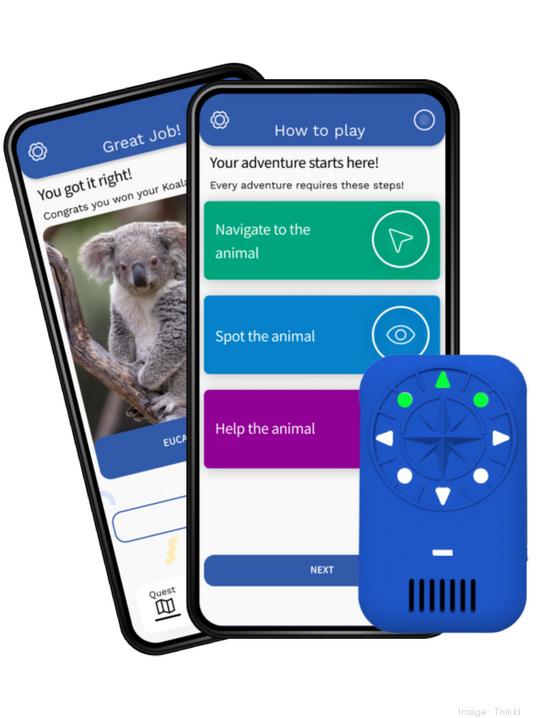
After launching its kid-directed Explorer Quest app at ZooTampa in October and the Philadelphia Zoo shortly thereafter, wearable Internet of Things company Trakid has its sights set on the Jacksonville Zoo and Gardens as the next stop for the gamified educational tracking device company
With the Jacksonville launch date less than a week away, 25-year-old CEO Brandon Kashani sees the interest in innovation from the Jacksonville Zoo's leadership as essential for companies like his to thrive and help bring parks into the future.
The Trakid device — available for rental in Jacksonville on March 1 — consists of a “Smart Compass” bracelet worn by children which navigates them to a destination chosen by their parent from a corresponding smartphone app. The child, feeling like the leader of the journey, will be told by their vibrating Smart Compass when an animal is nearby. Approaching the animal, the parent will be shown facts on their app about the animal or exhibit which they can share with their child, among other features which can be modified by the zoo itself.
Kelly Rouillard, director of marketing for Jacksonville Zoo, said that for the Jacksonville Zoo, the interest in the partnership stems from a belief that Trakid's programming will strengthen its ability to achieve its mission, which is to connect the community with wildlife through education.
The partnership also gives the zoo an additional revenue stream, since Trakid rental revenue is shared between the zoo and Trakid. Moreover, it helps the zoo secure state and federal grants, as it demonstrates expanded offerings of educational opportunities to the community. Revenue earned by Jacksonville Zoo from Trakid, Rouillard said, goes directly into additional programming.
“We’re a nonprofit, but at the end of the day, we’re still a business,” she said.
There are dozens of other venues on the waiting list behind Jacksonville Zoo. To date, the Raleigh, North Carolina-based company has raised $2.8 million and is $500,000 into a $2 million seed round.
The Drawing Board
The idea for Trakid came to Kashani when he was a senior at North Carolina State University. A chemical engineering major who relocated to NCSU from London to start college when he was 15, Kashani’s trajectory took a sharp turn when he took an entrepreneurship class his senior year, realizing he held a passion for it that he didn’t hold for chemical engineering.
Trakid, originally conceived as a child tracking device for parents who were afraid of losing their children in amusement parks — Track-Kid — was a project of his for that class. Having witnessed his parents get separated from his little sister a few times when his family was living in Dubai, he understood how intense the anxiety of that experience can be.
“It’s a big problem,” he said. “I don’t want any parent to have to go through that.”
After graduating, Kashani found a technical co-founder and raised $830,000 over 11 months for his product, for which he signed a contract with Virginia amusement park Kings Dominion to launch in March 2020, along with letters of intent to pilot Trakid in some other parks.
“Three days before launch, the pandemic hit and our entire target market shut down,” he recalled. “And I was trying to figure out, OK, how can I take this product into a different industry?”
Kashani landed on zoos, which are outdoors and therefore less hospitable to airborne viruses. Dusting himself off after the initial aborted launch, he met with 14 zoos, all of whom told him they weren’t interested. But at an auspicious meeting with ZooTampa, he was told the problem with his product was that it bombarded zoogoers with negative possibilities right as they entered. Plus, parents losing track of their children is less of a problem at zoos than at larger, more crowded amusement parks.
“One of our company advisors had told me like, ‘Imagine you go to a movie theater and they’re selling you Coke products, candy, Twizzlers, child abduction bracelets and bulletproof vests?’” Kashani said. “What are you gonna think as a parent? ‘Do kids get kidnapped here?’”
He left the meeting, did some product market fit research and raised $1.5 million for Trakid’s next chapter, which utilized the technology of the tracking bracelets — which are controlled and tracked by an iPhone app — for the purpose of a gamified education experience.
Looking Forward
Next on the list of venues for Trakid to be implemented is Detroit Zoo — with April given as a likely launch date — though Kashani expects to pick up five or six more venues in total this year. Most of these will be zoos, but there might also be an amusement park or two, allowing Trakid to demonstrate expanded offerings.
With the company generating revenue but not yet profitable, Kashani said the main focuses for Trakid are tinkering with the product roadmap and scaling. The reason for the long list of zoos and other parks interested in adopting Trakid is that the company simply does doesn’t have the bandwidth — financial or otherwise — to exploit all those entities’ demand.
Continuing fundraising will be an essential part of that effort. In Jacksonville, Kashani has spoken with a few equity funds, has been passed on by some and is still looking to hear back from other local angel investors.
While getting the adoption rate high — 100 to 300 rentals a day in Jacksonville by the summer would be “absolutely incredible,” he said — Kashani’s ultimate goal is much bigger. In the next three to five years, he said, he would like Trakid to simply be part of the offerings given to everyone admitted to partnering zoos or other parks, with the venue giving a percentage of the ticket prices to Trakid, which at this point will have a very different business model.
Kashani believes Jacksonville Zoo will be the first to accomplish that for him, based on its innovative leadership.
“We don’t want to be this side offering at the park,” he said. “We want to become the main guest experience there.”
Going forward, Rouillard said the Jacksonville Zoo will be monitoring the adoption rate to visitors renting Trakid devices, but added that leadership at the zoo are confident in the viability of the program.
"We think it's going to be a valuable asset to the community ... and offers a lot of value to customers," she said.








